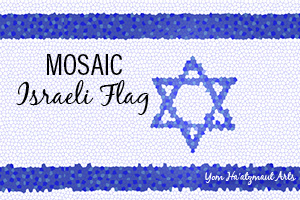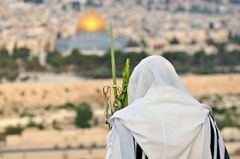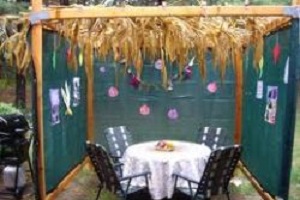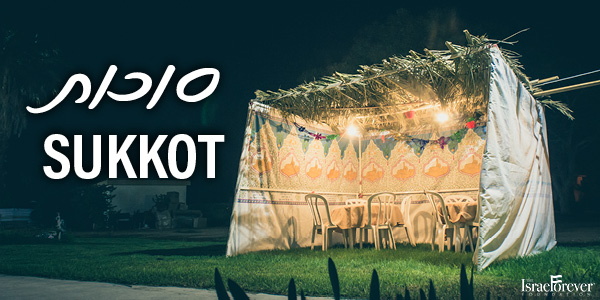17 Ways You Know Sukkot Is Coming in Israel
1. The tourists have landed! Overwhelmingly religious, English and French speaking, they jam the city’s take-out places and restaurants. The well-dressed visitors may be seen in packs wandering up and down Emek Refaim Street and through the glitzy Mamilla Mall talking to their friends on their Blackberry or iPhones in English at top volume.
2. The clang of metal poles and the sounds of hammering are practically constant as Jerusalem’s apartment dwellers hurry to erect their sukkot and squeeze them into small balconies, odd-shaped gardens and otherwise derelict rooftops.
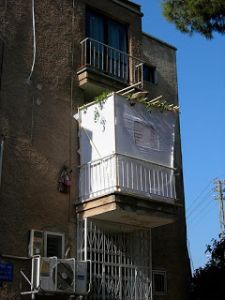
3. Almost every non-profit group worth its salt has scheduled a fund-raising and/or familiarization event for the intermediate days of Sukkot.
4. Real estate agents are taking a deep breath before their busiest week of the year as they prepare to pitch their over-priced wares to eager foreign buyers. Each of the many luxury residential building projects around town has managed to put up billboards depicting the completed construction and inviting prospective buyers for a tour of an unfinished building site.
5. You can’t get on a bus or ride the light rail without being poked in the rear a dozen times by someone’s stray lulav.
6. The sweet smell of etrogim in Jerusalem’s Machane Yehuda is overpowering. Huge crowds descend on a lot on Jaffa Road near the market to vie for the most shapely lulav and etrog.
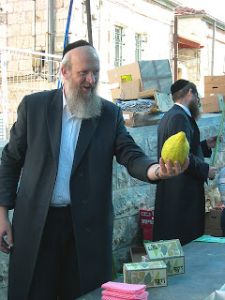
7. One enterprising bookstore is offering “Machzor rentals” for tourists who inadvertently left their holiday prayer books at home.
8. You’ve never seen such gaudy sukkah decorations in your life—unless you’ve been to Wal-Mart on Christmas Eve. Kiosks manned by bearded Haredim are selling gold, green and red tinsel hangings, made in China and exact replicas of Christmas decorations in the old country.
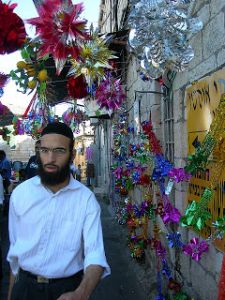
9. Huge piles of schach (palm fronds for the roof of the sukkah) cover major city squares, and citizens are invited to take as much as they need for free.
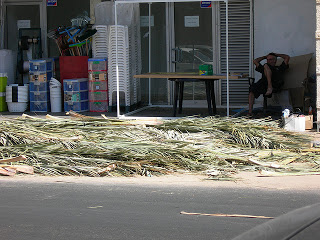
10. The usual throngs of traditional Jews are expected at the Western Wall for the thrice-yearly observance of the ancient ritual of Birkat Cohanim –the Blessing by the Priests–that takes place during the intermediate days of Sukkot.
11. Thousands more Jerusalemites and visitors will stand in line outside the official Presidential Residence on Hanassi Street in Talbieh to press the flesh with President Shimon Peres. Traditionally every Israel president opens the residence on Sukkot.
12. Like Christmas tree lots back in the US, empty city lots all over Jerusalem are taken over to sell sukkot of every size and description. Some are marketed by large companies and feature the latest space-saving technology and hardiest materials, while others are simpler affairs made of tubular piping and fabric walls. Every kosher restaurant in town has a sukkah of some kind and each boasts bigger and better holiday specials to entice customers.
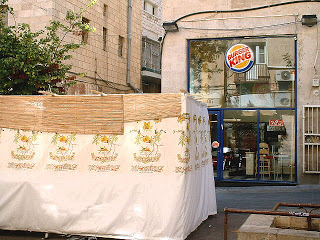
13. Since the entire week of Sukkot is a national holiday you’ll have a tough time deciding which festival/event to take part in. There’s the Fringe Theater Festival in Akko; the Haifa International Film Festival; The Tamar music and arts fest at Ein Gedi; the Storytelling Festival in Givatayim and the Gush Etzion Jewish Music and Theater Festival to name just a few.
14. Touring the country is another favorite Sukkot activity and every political group is promoting trips to “See For Yourself.” Hebron is a perennial favorite for the intermediate festival days as the Isaac Hall in the Cave of the Patriarchs that’s normally off-limits to Jewish visitors is open for the holiday.
15. Not to be left out, Christian friends of Israel who will take part in another annual Sukkot event, the Jerusalem March, where tens of thousands proudly march through several routes in the capital.
16. Another prominent group of tourists set to arrive are refugees from the young American frum singles scene who make an annual migration to Jerusalem from the Upper West Side for Sukkot. Discreet meetings of earnest, well-scrubbed, modestly dressed twenty-somethings take place in all the major hotel lobbies.
17. The Israelis living in the south or in Northern Israel will not need to be reminded of one of the essential messages of Sukkot – our reliance on God for sustenance and shelter.
Posted by Judy Lash Balint, Jerusalem Diaries Blogspot
Recommended for you:
As we enter the Sukkah, let us consider the impermanence of existence and find our connection to Zion, the one place that has always been a permanent fixture of Jewish life.
About the Author



